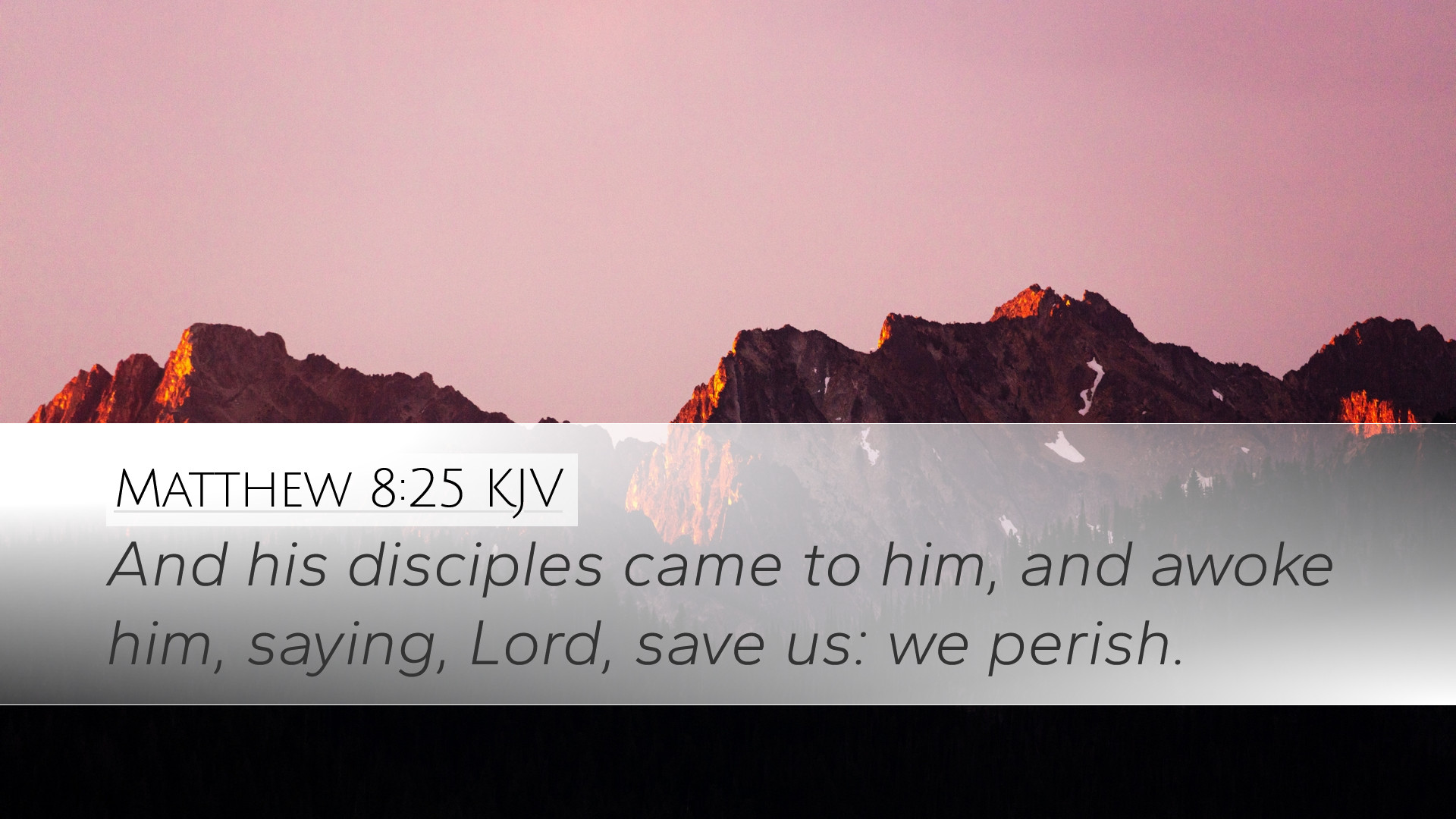Commentary on Matthew 8:25
Matthew 8:25 states, "And his disciples came to him, and awoke him, saying, Lord, save us: we perish." This verse occurs in the context of a significant episode in the Gospels, where we see Jesus in a boat with His disciples amidst a storm. The disciples' plea for help reflects their fear and desperation, yet it is also a moment full of spiritual significance.
Contextual Overview
In examining this verse, it is important to understand the setting. The verses preceding Matthew 8:25 recount the journey of Jesus and His disciples across the Sea of Galilee. The sudden storm symbolizes not just a physical threat but also the spiritual turmoil faced by the disciples. The fact that Jesus was asleep demonstrates His peace and authority over nature, which becomes a focal point for interpretation.
Insights from Public Domain Commentaries
Matthew Henry's Commentary
Matthew Henry notes that the disciples' fear was a natural response to the peril they faced. He emphasizes that they came to Jesus, recognizing Him as their only hope in the midst of danger. Henry points out that their cry, "Lord, save us; we perish," reflects both urgency and desperation. He further suggests that such moments illustrate human frailty and the need for divine intervention.
Albert Barnes' Notes
Albert Barnes highlights that the disciples' appeal is indicative of their growing understanding of Jesus’ authority. He reflects on the phrase "we perish," suggesting that it embodies the very real fears of those who find themselves in life-threatening situations. Barnes encourages readers to see their plea as a model of prayer when faced with overwhelming circumstances, focusing on the necessity of faith even amidst turmoil.
Adam Clarke's Commentary
Adam Clarke expands on the emotional state of the disciples when they awaken Jesus. He remarks that their fears are both physical and spiritual, showing a lack of faith in the midst of their predicament. Clarke interprets the act of waking Jesus as an act of faith, albeit one mixed with doubt. He notes that this interaction teaches believers about the importance of calling upon Christ in times of trouble, emphasizing that Jesus is always present to respond to our needs.
Theological Reflections
The plea of the disciples serves as a profound reminder of the human condition— frail, fearful, and in need of salvation. Theologically, it can be viewed as a microcosm of the believer's journey. Just as the disciples faced a literal storm, believers often face figurative storms in life that threaten to overwhelm them. This verse calls for a recognition of Christ’s sovereignty even in the most formidable challenges.
The Nature of Faith during Trials
In moments of trial, the disciples’ response prompts us to consider the nature of our faith. When confronted with crises, are we quick to turn to Christ like the disciples? Their cry was not one of calm assurance but of panic, reflecting a common human response to fear. This teaches that faith can grow even amidst initial doubt, serving as encouragement for believers experiencing their storms.
Christ’s Response
Though this verse focuses on the disciples’ plea, it is important to anticipate Christ's response, which is a powerful testament to His identity as Savior. This response illustrates His compassion and ability to calm the storms in our lives. Matthew Henry notes that Jesus' awaking symbolizes His readiness to help those who call upon Him in sincerity and faith.
Practical Applications
For pastors, students, and scholars, this passage offers multiple practical applications:
- Encouragement to Trust: In teaching others, emphasize the importance of trusting Christ during life's storms, reminding them that He is always aware of their situations, even when He seems distant.
- Modeling Prayer: Encourage the faithful to approach God in prayer with both urgency and sincerity, just as the disciples did, recognizing that their cries are heard by a compassionate Savior.
- Understanding Spiritual Growth: Reflect on the journey of the disciples from fear to faith, illustrating how crises can lead to spiritual maturity and deeper trust in God.
- Celebrating Christ's Authority: Proclaim the sovereignty of Christ over creation, reassuring congregations that He is greater than their fears and capable of bringing peace to their lives.
Conclusion
In summary, Matthew 8:25 serves as a poignant reminder of the interplay between fear and faith. The disciples' urgent plea "Lord, save us: we perish!" encapsulates a universal cry for help that resonates with many believers today. By leaning into the insights from established commentaries, we can glean valuable lessons about human frailty, divine presence, and the hope found in Christ amidst the storms of life. Such reflections not only enhance our understanding of this passage but also empower us to apply its truths in our lives and ministries.


